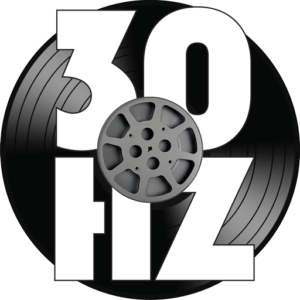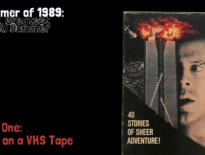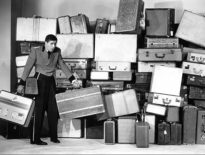I’ve decided to start posting chapter drafts of my manuscript about the summer movies of 1989. In light of our current quarantine situation, my writing has become nothing but a chore. I’m home-schooling kids and maintaining stress levels and writing and research has become the most impossible thing in my world. I can barely type a sentence without fielding a homework question. (Technology and seven year olds do not mix.) I try at night. I try in the morning. Distraction is required, but distraction is a terrible writing bedfellow. I know many won’t read these pages, but if you do, please your thoughtful comments. I hope our communication causes me to get back to writing. I hope writing once again becomes the distraction rather than the chore.

Introduction: Bryan Adams Was 9 Years Old During the Summer of ’69 (and Why That Matters in a Book About the Movies of 1989)
The “Summer of ‘69” represents Canadian Music Hall of Fame inductee Bryan Adams’ defining 212 seconds.
Feel free to argue in favor of “(Everything I Do) I Do It for You,” from Robin Hood: Prince of Thieves, but you’d be wrong. First of all, the song is either 394 or 246 seconds depending whether you’re enjoying the album version or radio edit. Secondly, After a rigorous, scientific study[1] of pop-format radio factoring in things like algorithms, biorhythms and Janet Jackson’s Rhythm Nation, I’ve determined that if you turn on any given radio station in the 21st century, you’ve a 217% greater chance of hearing “Summer of ’69” than any other Bryan Adams song. In fact, now that you’ve read this, I guarantee you’ll hear Bryan Adams today. And maybe even Bryan Ferry and definitely Janet Jackson because do you remember how many amazing cuts came from Rhythm Nation 1814? (All of them.)
Bryan Adams, in the “Summer of ’69,” croons about acquiring his first real guitar and the failings of his garage band, hanging out at the drive-in, but it’s a song about nostalgia for being young and in love with nothing much better to do.
Important fact – or at least an important fact in light of the back door I’m going to use to bridge this wayward conversation into something cinematically relevant. I always attributed these lyrics to Bryan Adams but the singer was only nine during that supposedly idyllic summer of 1969. Rather than jumping to conclusions about the Bryan Adams Time Paradox, I chose the Google. Alas, no time paradox required; Mr. Adams croons about Jim Vallance’s summer, when his songwriter would have been a ripe and ready 17. After turning this fact over in my brain, I came to the following realizations.
- I’ve always prematurely aged Bryan Adams about 7-8 years.
- The ‘Summer of 77’ would have required a much less appealing rhyme scheme as it would have succumbed to its prosaic instincts and included the word “heaven.”
- I’m not actually that interested in Jim Vallance’s summer, but it sounds nice in song and works so well because it makes me nostalgic for a time that I never experienced.
This made me take stock to my own “summer of 1969.” If I’d written an ode to my parallel 17-year-old summer of ‘96, it’d have leaned heavily on arcades, midnight putt-putt, and sneak-in triple features at local multiplexes. Personally, I’m very much concerned about potential “arcade” inspired lyrics. My hopes and dreams at 17 merely represented the perpetuation of dreams implanted the summer just before my 10th birthday, the resplendent summer of 1989 – the equivalent of Bryan Adams’ 1969. The year during which I presume he listened to the Beatles’ Abbey Road and it changed his life forever, allowing him to pursue his own ill-fated garage band in the summer of 1977. This history writes itself. No fact-checking necessary.
Fact check: Bryan Guy Adams had already become a successful vocalist for the Vancouver band Sweeney Todd and would sign a contract with A&M records in 1978, having already met Mr. “Summer of ‘69” Jim Vallance the preceding year.
If there was no better time to be a rock and roll prodigy than 1969, there was also no better time to be a 10-year-old cinephile-in-training than the summer of 1989.
I couldn’t tell you much of anything about my day-to-day life. I subscribed to some early girlfriend program. Her name was Stacy. I conversed with her over a beige and corded rotary-dial phone. I misspelled “malicious” in the spelling bee because I slurred two letters together (but I knew how to spell the word, goddammit). I request that “he knew how to spell ‘malicious’” be printed in my obituary. I listened to Huey Lewis and the News while everyone else debated Jordan or Joey. They’re New Kids on the Block, by the way. You may not know it, but my generation has not yet evolved beyond NKOTB relations on a first-name basis. I pity any other Jordan or Joey that expects to be on a first-name basis with us twilight Gen-Xers.
Other than that? I went to the movies. I rented movies. I could tell you every movie I saw in the theater that summer and every movie I watched over the course of the year on VHS rentals. I can tell you where I saw them and probably what food I ate before going to the theater. A pair of plain Burger King double cheeseburgers and a Dr. Pepper. As far as I was concerned the world existed so that movies could be exhibited. It was the best of all realities, and I had no idea it wouldn’t last. I had no idea that I’d never see another summer quite like it because the movie business was about to change, radically and forever.
Chalk some of this feeling up to nostalgia. As adults we’ll never feel as passionately about anything as we did in our childhood. Our worlds opened up before us, an ever-expanding video store of potential. For some that meant first hearing a record that changed a life trajectory, a Broadway play that brought out unrealized, inner Sondheims. Whatever “it” was, that experience unlocked heretofore-unrealized passions and dreams. We elevated these moments into a realm of incorruptible purity and granted these discoveries the designation of being the best thing ever. Nostalgia preserves these emotions in suspended animation, mosquitos embedded in amber. (Those “summer of ‘93” Jurassic Park dinosaur nerds know exactly what I’m talking about.)
It could be that the summer of 1989 landed at just the right moment – that this nostalgia causes a particular movie season to float above the others, a buoy in an ocean of uniformly blasé Hollywood excess. As I’ve grown older and the dissonance between the reality and the childhood experience increases, it’s still this summer that resonates as the great intersection of emotion and nostalgia-free, objective greatness. The summer of 1989 was the best summer movie season in Hollywood history – not the most original or objectively pure (in the most Peter Biskind-y of evaluations) – but in the I’ve-got-nothing-else-to-do-let’s-all-go-to-the-movies-because-everything-is-awesome kind of best. I’ll take all challengers. It also, with the benefit of hindsight, represented a cataclysmic shift in the industry. A simultaneous lurch forward into the modern franchise era and the subtle deathgasm of 1970’s auteurism. (Don’t tell Biskind.) It was primarily, however, the end of the wildly innovative and irresponsible pop-entertainment of the 1980’s.
Contrary to all calendars, my summer of 1989 actually began, in earnest, the weekend of June 8th, 1984. Until that date, movies came and went and maybe I journeyed to a theater according to the moviegoing whims of my parents and maybe I didn’t. I’d never put skin in the game; I’d never had much in the way of my own opinions. Disney re-releases and the occasional PG-rated movie that my parents decided was a must-see. (Keep in mind that these were still “80’s PG,” so frivolous nudity and minor-to-rampant bloodletting fell under the auspices of general “parental guidance.”) Everything was new and good because I had nothing with which to compare it. My earliest theatrical memories involve some symphonic mélange of Bambi, Return of the Jedi, and Romancing the Stone[2].
At the age of six, however, that all irrevocably changed when I became receptive to marketing. Hollywood opened up a tunnel into our prepubescent brains and lit up our nucleus accumbens[3] like a pinball machine. Movie trailers. Sticker books. Novelizations. Happy meals. Cereal. Hi-C Ecto Coolers. Toxic. Green. Delicious. All of these things manifested during the lead-up to the release of both Ghostbusters and Gremlins on June 8th, 1984. The Hollywood hype machine worked its magic. Not only was I aware of these movies, I anticipated their assured greatness. Calling this anything less than an awakening in light of what would follow would be an understatement.
I remember vividly my first theatrical experience with Ghostbusters. Five-going-on-six and cowering behind slatted fingers, viewing the ghostly, sound-conscious librarian with an inseparable mixture of fear and anticipation. My first taste of modern horror cinema, the inability to watch, the inability to look away. Hook. Line. Sinker. Adults jump out of planes for the same rush I felt watching these two movies a combined total of seven times that summer. Each trip cost $4 and a sack of salty popcorn. I just had to convince my parents to take me to the movies, which wasn’t necessarily as easy as it sounds.
I grew up in a small town in Southwestern Michigan and this posed some challenges to this new hobby of mine. If not for the fact that these two films remained in circulation throughout much of the year in first run and then in our relatively more local second-run theater – I may not have made such a clear and immediate connection. My parents could not have anticipated the fallout. (An undergraduate degree in Film Studies certainly never stood out as a potential endgame to taking me to see Ghostbusters so many times.)
Return of the Jedi excepted, I’d not been aware of release dates as I found movies almost exclusively from the shelves of my local video store. As the product of parents who believed in wide-open but parentally-guided viewing, I was allowed to rent and view most any title that interested me – so long as they provided constant reminders that certain language or actions remained taboo for decent and/or small humans. At a certain point I began pre-emptively turning to my mother and saying “Language!” in response to a lack of on-screen decorum.
As an only child I would retreat to my room with my bins of Star Wars, He-Man and Transformers figures and play out elaborate Shakespearean melodramas that generally involved a lot of setting up idling Stormtroopers like rows of dominoes. (I once paused Return of the Jedi during the Emperor’s arrival on the Death Star to count the number of Stormtroopers present so that I could request that many for Christmas. While I never achieved the stated number of standard-issue Stormtroopers I did have enough for a small tactical division that mostly just idled outside the gate of Castle Greyskull talking about the weather and rising interest rates.)
R-rated movies entered my frame of reference as early as 1984. Beverly Hills Cop, Animal House, and Stripes became household fixtures. As long as I refrained from abusing my relatively more adult viewing privileges, I could still choose from those beautiful new release shelves filled with shiny, unsullied VHS tapes encased in clear, plastic, strictly-for-rental covers. Exploitative violence would come in time, but first there was language and some of that aforementioned occasional, frivolous 1980s-brand nudity. To this my mother would sigh; I would pretend not to notice by feigning distraction and humming something unrelated and pure like “Mahna Mahna” from The Muppet Show. Also, not a day goes by without “Mahna Mahna” running through my head at least once so at best I’m making an educated guess here. I’m very sure, however, that I understood the awkward subtext of the situation. Old enough to know I was kinda-sorta interested in girls and that feigning indifference around my parents offered the surest route around those conversational pre-pubescent landmines. I managed to hold those back for at least another couple years.
It was during this time that I also became acutely aware of the release schedule at my local video store, a chalkboard to the left of the desk on which clerks scrawled the coming titles from the next three or so weeks. With the veracity with which I once stockpiled dinosaur genus and species I now counted down the minutes until the VHS release of Police Academy 3: Back in Training.
Outside Gremlins and Ghostbusters, I remember few other theatrical trips between 1984 and 1989. I could name other movies I first saw in the theater, but the experience, the concrete memories have all but dissipated. There’s no connection.
Even if you weren’t around or old enough to similarly experience 1989, you likely have your own 1989, the year that movies or music became more than just background noise. The year these movies became permanent moments in time, post-it notes that trigger memories enough to fill shoeboxes and nostalgia for a time that no longer exists. The fabric on the chairs of your multiplex. The way the each specific theater’s popcorn smelled upon stepping into the lobby. Perhaps the numbing repetition of an AMC pre-show bumper. The short-supply marquee letters for which vaguely similar numbers had become substitutions long before Se7en made it socially acceptable. I once recall an upside down “4” representing an “n.”
In as much as I’m writing a love letter to 1989, my 1989, it’s likewise an ode to everyone’s 1989 – be it 1993 or 1939. These first loves never leave us. Even as we consume thousands of subsequent movies, the 1989s in our life remain more immediate than the movies we watched just last week. These were dreams written on clean sheets of parchment rather than palimpsestuous layers of Hollywood regurgitation. Their sense of permanence only becomes stronger as their origin stories become more meaningful. We grow and age and reflect on them as formative touchstones. Who we’ve become as adults owes much to our 1989, our year of cinematic awakening.
The indulgence in nostalgia shouldn’t be considered a dirty exercise in solipsism. Allowing ourselves a gateway to the gooey trappings of our carefree years reminds us that “frivolous” things like music and movies do have the power to transcend time and space. They create bonds between people. Permanent memories of shared experiences. The feelings I had upon first watching Tim Burton’s Batman or waiting impatiently for that long-promised Ghostbusters sequel, reveling in the confidence that Weird Al’s UHF would become an instant classic – these things can all be summoned at a moment’s notice – the press of a button, the click of a mouse. I know exactly who sat beside me and I cherish all of these moments. Drink from the fire hose, experience Carpathian kitten loss, and definitely dance with the devil under the pale moonlight. It’s not a crime to give into the desire to backslide into our past selves when movies meant everything and the rest of it was just stuff preventing you from watching movies.
1989 taught me what it meant to be an obsessive – not just about movies, but about pursuing the things that seem to love you in return. I devoured movies, and movies in turn taught me something about life. The agony and ecstasy of anticipation and disappointment, that sometimes the best laid plans go awry and not everyone gets their just desserts. Good often wins, but not always. That it’s okay to love, to feel emotion. That thrills and comedy provide necessary escapes from dull or sometimes grueling reality. But all these things would come in time. In that moment, there were only flickering images projected through a semi-transparent plastic film base coated on one side with gelatin emulsion containing microscopically small light-sensitive silver halide crystals an onto a silver screen. That’s entertainment.
There’s a reason 1989 looms so large – not just in my own personal frame of reference, but also for the movie business itself. It’s as if 1989 represented a kind of temporal fulcrum, like Back to the Future II’s alternate, branching 1985s. The future of the film industry hung in the balance. To quote Joe Banks in Joe Versus the Volcano (unfortunately a 1990 film), “I didn’t know it—but I knew it.” Even if I didn’t know why 1989 felt so important, I recognized the smell of revolution.
I was young and in love with movies with nothing much better to do.
——————————-
[1] I scanned XM/Sirius Radio channels 80’s on 8 and 90’s on 9 for a week. During this time period I heard “Summer of ‘69” three times and “(Everything I Do) I Do It For You” once.
[2] My favorite 1984 movie moment? When Bambi and Thumper got high on the stash they found in the plane carcass high atop the Ewok Village canopy and forgot to take down the forcefield around Cartagena.
[3] The pleasure center.



